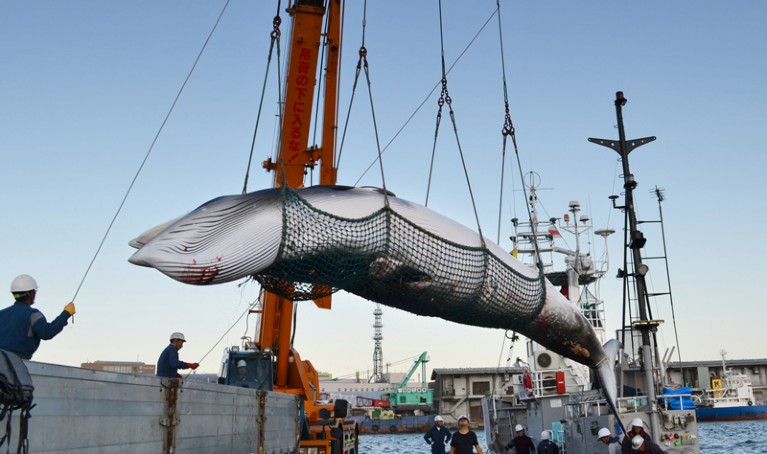
Japan’s exit from the International Whaling Commission should encourage a stronger role for science.Credit: Kyodo News/Getty
The International Whaling Commission (IWC) has always existed in uneasy tension between those who want to protect whales and those who also want to eat them. Late last year, the tension finally snapped with the announcement from Japan that it is leaving. This was accompanied by a pledge that the nation will resume commercial whaling in the Pacific Ocean, and end its controversial research whaling programme in Antarctic waters.
Japan’s decision is clearly a setback for most IWC member countries that oppose commercial whaling, and possibly bad news for whale populations: the IWC has overseen an increase in Southern Ocean blue whale (Balaenoptera musculus) numbers from 400 to 2,300 in the past 50 years. Humpback whales (Megaptera novaeangliae) are doing better, up from 7,000 to 97,000 in the same period. It is also through the IWC that we know that 300,000 cetaceans (whales, dolphins and porpoises) die annually as a result of accidental capture in fishing gear, or by-catch.
Contributing £124,068 (US$158,429) a year, Japan was the largest donor to the IWC’s core budget, which covers staffing, conferences and science. This funding will not be easy to replace. But Japan’s action is not unexpected and its decision, although unfortunate, has the potential for at least one positive effect: it creates an opportunity for a fresh start for the science and conservation aspects of the IWC’s work.
The IWC’s remaining members now have the chance to remove some of the politics that have stalked cetacean science and conservation and to give their researchers more autonomy and independence. They should act quickly to do so.
One long-standing problem in the IWC is that the researcher voice carries less weight compared with that of scientists for other multilateral environmental agreements. Cetacean researchers advise member states as part of the IWC’s Scientific Committee. The committee is an internal body, which means that even though its members are acknowledged world authorities, they cannot function with the independence and clout of, say, the Intergovernmental Panel on Climate Change (IPCC).
Take the 1986 moratorium on commercial whaling. In 1994 (after eight years of research and development), the IWC’s Scientific Committee persuaded member nations that a figure could be put on sustainable catches for whale species that were subject to renewed commercial whaling. This raised hopes among whaling nations that a robust scientific basis had been found for the moratorium to be lifted. But the governments of non-whaling nations would not allow this without a parallel system to monitor and verify whale catches. That is reasonable. What is difficult to understand, however, is how talks on such a system are still ongoing 25 years later. A more independent scientific body would be able to suggest ways to break the deadlock.
Advice from autonomous scientists might also have helped to prevent a lengthy dispute over Japan’s expansion of scientific whaling that ended up in the International Court of Justice. In 2005, Japan increased its research hunt (the whaling treaty allows limited numbers of whales to be caught for research purposes, after which whale meat can be sold for food) of minke whales (Balaenoptera acutorostrata and Balaenoptera bonaerensis) from 400 to 850, and issued permits for two new species (fin whales, Balaenoptera physalus, and humpback whales). This followed reports of their recovery. More dead whales, Japan argued, would lead to better data on the ratio of young to old, mortality and age of sexual maturity. As an internal IWC body, the Scientific Committee was unable to openly question Japan’s actions, and it was left to the court to weigh in almost a decade later and order a halt.
The paradox is that the IWC’s £316,000 research budget is the organization’s second-largest expenditure after staffing, and this feeds a perception among some nations that science has more influence on IWC decisions than it actually does. Conservation, by contrast, is funded out of voluntary donations. When an external review of the organization recommended a new full-time post of head of conservation last April, it was to help balance a perceived dominance of science.
Japan’s exit — and an end to its research whaling programme — offers a chance for member countries to reshuffle governance of science and conservation within the IWC. One option could be to spin off the IWC’s Scientific Committee to form an intergovernmental scientific body similar to the IPCC and the equivalent for biodiversity. The IPCC’s independence doesn’t stop the climate convention’s member states disregarding or challenging its reports, but it does bring such disagreements out into the open where they can be scrutinized. Another, less radical option for the IWC is to appoint a joint head of science and conservation, instead of two separate posts.
Japan’s IWC exit has been described as a rejection of multilateralism. This is not true. The recent history of countries who exit (and rejoin) international agreements include the United States and the United Kingdom — both of which have left and rejoined the United Nations Educational, Scientific and Cultural Organization since the 1980s.
Furthermore, even though Japan is leaving the IWC and resuming commercial whaling, it has promised to work within the bounds of other international conservation agreements, such as CITES, which regulates trade in endangered species, and the UN Convention on Biological Diversity. The government also says it intends to remain connected to the IWC as an observer.
This will offer little comfort to those opposed to the slaughter of these marine mammals on ethical grounds. And the fracturing of the IWC is, without doubt, a setback. The organization has already announced cuts to its science funding, and Japan leaving won’t help matters. But sometimes setbacks provide unexpected opportunities. Science and conservation can better inform IWC decisions. This opportunity must be grasped, or Japan’s exit might not be the last. And that would be bad news all round.
